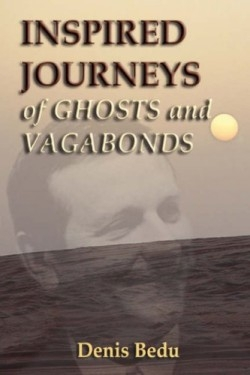Inspired Journeys of Ghosts and Vagabonds
Every ego demands clarity about itself / and the other. No labyrinth gives us clues / that allow us to decipher / where we are and who we are.
*—*Carlota Caulfield “Temple of Epigrams” from A Mapmaker’s Diary (2007)
Nicolas Dubet spends a childhood of pastoral reverie in verdant rural France moving to the city for college in the late ‘60s. After the untimely death of a serious girlfriend he takes her memory far afield immersing himself in a radically reordered life as a teacher in a pre-electrified village in central Africa. Though Nicolas’s parents clearly love him his father promotes a settled family existence and a regular career to no avail. It pains Nicolas to leave his parents behind yet the pull of distance is great even though the quest objectives seem amorphously uncertain. His is an open-ended voyage of discovery with ever-broadening perspective. Soon it is time to cross the Atlantic: “So like Mr. Columbus I discovered America with almost the same vessels. There would be many upcoming Ninas in my young American life a lovely Maria who wasn’t and never will be a Saint and a rusty Ford Pinto…”
A person predisposed to rootlessness finds it necessary to identify something as home base which isn’t tied to an immobile patch of ground. Without consciously deciding to the protagonist converts his conscience into a cargo vessel storing there the words image and comforting presence of his father. The old man becomes a phantom before his time. The constant traveler after some years says “…my Dad has been sleeping within me even before he died. Always been with me…”
The various countries visited are more than plot devices; Bedu’s artfully developed high-value descriptions of place are perhaps more sophisticated than the passages chronicling relationships. Because the setting changes so often the author makes a stepped-up effort to embed the narrative in time by liberally referencing the popular music and political luminaries of the day. Also the philosophical neighborhood is generally centered on the Sartre-Camus existentialist axis with a light Marcusian twist. Loves of various concentrations and sexual arrangements in different social milieu help Nicolas clarify his sense of personal ethics and racial justice and explore the nature of attachment.
The author stresses parallels to portions of Pasternak’s Dr. Zhivago dropping the title strategically naming some minor characters and aiming to cross-match them on message. The actual coincidence of story arcs are relatively spurious; this globe-trotting tale stands up fine without leaning on the Russian classic. A minor note on textual housekeeping: internal thought appears on the page in a form identical to speech.
Inspired Journeys of Ghosts and Vagabonds reframes coming of age as a continuous lifelong process. Its protagonist unhesitatingly trades innocence for experience yet retains a kernel of na&239;veté well into middle age. He embraces the world’s cultural variety and maintains a healthy introspective rigor at once. This recommended read poses and answers large questions without sacrificing a warmly approachable narrative flow.
Reviewed by
Todd Mercer
Disclosure: This article is not an endorsement, but a review. The publisher of this book provided free copies of the book and paid a small fee to have their book reviewed by a professional reviewer. Foreword Reviews and Clarion Reviews make no guarantee that the publisher will receive a positive review. Foreword Magazine, Inc. is disclosing this in accordance with the Federal Trade Commission’s 16 CFR, Part 255.

